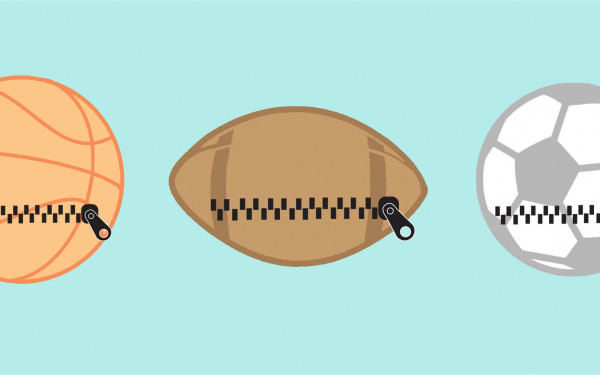What’s the deal with gym bros on steroids?
A look into the rise of non-athlete steroid use
Disclaimer: This article highlights both the negative and positive effects of PED use. The Link does not encourage the use of PEDs or any dangerous supplements, nor does it demonize those who choose to use PEDs despite the risks they carry.
The unearthing of Russia’s state-sponsored doping scheme in 2019 and their subsequent four-year Olympic ban opened a lot of sports fans’ eyes to an ugly truth.
At the highest level of sporting competitions, when sports are your livelihood and the stakes are high, some athletes feel the need to cheat.
If you've ever wondered why a professional athlete would use potentially dangerous performance-enhancing drugs (PEDs), you're not alone—but the answer is fairly simple.
“The desire to win, with all the accolades and financial benefits that can bring, can drive athletes to consider doping,” said Andrew Maggio, media relations and communications manager at the World Anti-Doping Agency (WADA), based in Montreal.
Many talented athletes have been found guilty of doping. Lance Armstrong was not only a superstar athlete but an American hero before his doping was investigated and eventually revealed. Jon Jones is still revered as one of the greatest mixed martial artists of all time and is widely considered to be the best UFC fighter of all time, despite his confirmed use of PEDs (among other scandals). Even Barry Bonds, though he claimed to not be responsible for his use of PEDs, admitted he doped and remains a frequent pick for the greatest baseball player of all time.
Most view the use of PEDs as cheating, and WADA, as Maggio explained, firmly agrees with this position.
“Those who look to cheat the system do so with the intention of having an unfair advantage over their competitors,” Maggio said, “which ultimately affects the integrity of any given competition.”
Yet despite the adage “cheaters never prosper,” we are quick to ignore the use of PEDs when looking at the totality of an athlete's career. Doping prevails at the highest level when praise, legendary status and money are thrown at known cheaters.
Recently, we saw the rise of steroid use amongst hardened gym-goers, a group with comparatively much less to gain from it than professional athletes. Content creators such as Sam Sulek and Togi best exemplify this phenomenon. The two have exploded in popularity since the start of 2023, attracting an audience of mostly young men who want to improve their wellness routines.
The influence of the countless other (non-doping) fitness creators among Gen Z demographics is not to be underestimated. The ABC Fitness Fall 2024 report examines the wellness lifestyle of multiple generations from Gen Z to Baby boomers. It found that 73 per cent of Gen Z claim to be a current member of a gym, health club or studio of some kind, with 55 per cent of that demographic being a member for less than a year.
That being said, some creators aren’t simply promoting active fitness.
Despite many allegations, Sulek has never fully admitted to using PEDs. However, bodybuilders like Greg Doucette claim that Sulek’s diet is inconsistent with one of a natural professional bodybuilder. Some can interpret this as an indirect promotion of personal PED use, as achieving his level of physique naturally would be a Sisyphean task for most.
On the other hand, Togi frequently posts manosphere-esque content about entrepreneurship and gambling, while directly explaining the benefits of steroid use in his life, even uploading a video in February earlier this year titled “I HATE BEING NATTY” (Natty or natural referring to the lack of steroid use). In fairness to Togi, he frequently says that gambling is a horrible idea and talks about how miserable Trenbolone—one of the most dangerous anabolic steroids, used for muscle growth in livestock—made him.
While these creators have certainly contributed to increased fitness activity among younger men, there have also been those who choose to follow the more dangerous aspects of their routines and engage in alleged anabolic steroid use as well as other PEDs.
They provide a glimpse into the life of someone who has been on steroids for a significant amount of time, but they do not represent the whole picture. For a glimpse into the beginning stages of personal steroid use, The Link spoke to Joey, whose name has been changed to maintain anonymity.
Joey is currently on his first “cycle” of testosterone enanthate or Test-E, an anabolic steroid that stimulates protein synthesis.
As of Sept. 23, he has been injecting 150mg of Test-E every other day. He also takes exemestane, an estrogen blocker, to maintain his hormone balance. Joey claims that balancing his hormones has been the hardest part of his journey so far. Before he used exemestane, he noticed his estrogen levels were too high, which caused him to have increased water weight in his muscles, along with severe acne flare-ups and emotional distress. To combat this, he began using estrogen blockers, which came with their own problems.
“I was taking 12.5mg [of exemestane] twice a week until my estrogen levels crashed,” Joey said. “I was feeling great until around week two. More confident, level-headed and an extremely high sex drive. Everything was pretty positive until my estrogen crashed.”
He goes on to explain his estrogen crash, when “everything flipped on its head.”
“I was extremely irritable, depressed, tired, with no sex drive for a couple of days until my estrogen went back to normal,” Joey said.
To increase his muscle gain from steroids, he has also been taking MK-677, an experimental research chemical that causes temporary muscle growth, better sleep and an increased appetite. Its long-term benefits aren’t clear, but at least one clinical trial was stopped early due to worries about its side effects according to Healthy Male, an Australian organization dedicated to providing Men’s health information.
When asked how much online personalities influenced his decision to juice, Joey jokingly responded, “Togi is my idol,” but does admit that Togi did inform his decision “quite a bit.”
Overall, Joey claims to be feeling better mentally and has gained 11kg in just over three weeks with an increase in strength alongside that.
While Joey’s case is a positive one overall, it is worth noting that he has been using PEDs for an extremely short period, less than a month, and has already had one major repercussion with his estrogen crash.
Maggio pointed out that WADA ultimately exists to protect athletes from these powerful and dangerous substances precisely because they pose a threat to their health.
He claims that the use of PEDs should only be taken, “if at all,” as prescribed and supervised by medical professionals and that their abuse “can have dire consequences.” Maggio added that throughout history, “performance-enhancing drugs have taken a terrible physical and mental toll on many athletes. Some have died.”
The rise of internet personalities promoting known risky substances is a growing problem. Even Joey, who likely has a more positive opinion on steroids than most, told me of his uncertainty regarding his continued use of PEDs.
“I think it’s 50-50 if I do another cycle,” he said. He will, however, weigh his options.
“It works for me, but long term there’s health downsides, like high blood pressure,” Joey said. “The heart is a muscle too, and an enlarged heart from years of use is something I want to avoid.”
This article originally appeared in Volume 45, Issue 4, published October 22, 2024.




_600_375_90_s_c1.JPG)


